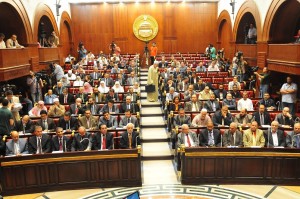
(File Photo)(DNE/ FILE PHOTO)
A protest bill proposed by the government threatens the right to demonstrate in addition to encouraging police brutality, human rights organisations have said.
The drafted protest bill was sent to the Shura Council to be reviewed. The bill, drafted by the Ministry of Justice, will then be voted upon by members in the upper house of parliament and, if passed, will be signed into law by President Mohamed Morsi.
The proposed bill stirred controversy among activists and human rights organisations who argue it infringes upon freedoms of expression and movement, the right to protest, the right to strike, and sanctions the use violence by security forces against protesters.
“This law infringes upon the right to protest and freedom of movement,” said Ahmed Ezzat, who heads the legal unit of the Association for Freedom of Thought and Expression.
Ezzat told Daily News Egypt that the bill limits protesting in several ways. The first being the stipulation that protesters notify the Ministry of Interior of the protest ahead of time, giving scope for the ministry to interfere in the protest.
The draft bill states that protesters must inform the police station which holds the jurisdiction over the area in which they plan on protesting three days in advance.
It also requires that the notification include the place of the protest, the time it will begin and the time it will end. Protest organisers will also have to provide the police with the reasons for the protest and the demands of the participants.
More alarmingly, said Ezzat, the protesters will have to provide the names, addresses signatures, and contact information of at least three organisers.
“This bill simply changes the constitutional provision to notify authorities before protests into effectively asking the Ministry of Interior’s permission to hold them,” he said.
Under the law, the police will have the power to change the place the protest is held if it is in the interest of security.
“This bill also violates the right to freedom of expression through its banning of certain banners, chants, and songs,” said Ezzat, adding that his association already has problems with the criminal punishments currently in place for these offenses.
The bill bans “carrying banners or making statements, chants or songs” that qualify as “slander, libel, contempt or insult of heavenly religions, cause strife, or call for hate and violence”, according to Article 15 of the bill’s first draft.
It also empowers security forces to use violence and violate the right to life, said Ezzat. The law gives police increasing powers in dispersing protests if they threaten public security. Police officers are required to first publicly inform protesters they have to leave.
If unsanctioned protests continue, police would be authorised to employ a gradual system of forced dispersasl, beginning with water cannons, then teargas, followed by shooting birdshot bullets in the air or using sound guns, and finally beating protesters with batons.
“Lawmakers think that way they are reducing police brutality, but things like teargas canisters violate the right to health and safety from bodily harm,” Ezzat said. “Furthermore, the law empowers the police to use even more force if they feel threatened.”
Article 16 of the draft bill allows policemen to “use stronger force than mentioned in situations listed in the Penal Code, the police law or on orders from a judge.”
Finally, Ezzat believes that the bill directly challenges international and regional treaties like the UN Universal Declaration of Human Rights and the African Charter on Human and Peoples’ Rights that both protect the right to protest.
Social and economic rights would also be threatened by this bill, which bans blocking roads and traffic, disrupting the interests of citizens, and infringing upon the right to work.
These provisions, Ezzat said, are directed at labour strikes and other forms of economic interest-based protests. Actions such as blocking roads, factory strikes or civil disobedience would effectively be completely banned if the bill passes into law.
